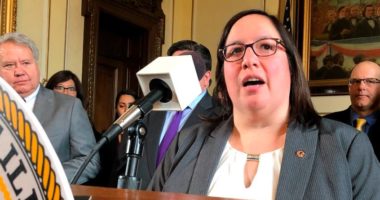
An Illinois Senate resolution aims to calculate the hypothetical tax revenue that could have been generated if online casino gambling had been legalized in February 2020.
According to the synopsis, State Sen. Cristina Castro is the sponsor of the resolution.
If Illinois were to legalize online gambling as of February 28, 2020, it is suggested that the Commission on Government Forecasting and Accountability furnish the Illinois Senate with revenue projections related to a potential privilege tax.
The document must be submitted by October 1, 2021, to avoid any additional fees. The approaching deadline could have adverse effects on online casinos this quarter, according to the signs.
With that said, this is a promising sign for the future of online casinos in Illinois, as shown by the significant interest from different members of the legislature.
The report highlights the importance of Feb. 28, 2020, as a crucial date because of the effect of the COVID-19 pandemic on traditional casinos in Illinois.
The following excerpt from the resolution is also crucial:
Some Illinois residents are choosing to stay home and play online games as a way to avoid the risks of pandemics. This has also prompted several casinos to close their doors in order to protect their patrons and employees.
The study also examines how different luxury tax rates impact income, requesting estimates for various privilege tax rates ranging from 12% to 16%.
In the Illinois House and Senate, there are costs for online casinos.
Online entertainment expenses are present in both the Illinois House and Senate, but the legislative session is coming to a close.
The Internet Gaming Act, also known as HB 3142, has garnered more scrutiny and was a focal point of conversation during the House Executive Committee Hearing in April. This legislation suggests implementing a 12% privilege tax on profits generated from online gaming.
Online poker in Illinois is allowed with a limit of 36 skins. Those wanting to engage in online casino betting must register in-person for six months, which is a simpler process compared to the requirements outlined in the Sports Wagering Act.
What might the document reveal?
When looking at the countrywide trend, it’s hard to ignore the impressive numbers that other states are seeing from online casinos.
For instance, let’s look at Michigan. In April, operators in the state earned a profit of $94.9 million, resulting in $23 million in state and local tax revenue.
Michigan has only recently permitted online casinos, and the industry is still in its early stages of development.
When you compare those numbers with the revenues from Illinois sports betting, there is no comparison.
March was a historic month for sports betting in Illinois, setting all-time records in handle, operator revenue, and tax revenue. Only New Jersey and Nevada surpassed Illinois in handle for the same month.
Illinois sports betting had its most successful month to date, bringing in just over $7 million in state and local tax revenue.
The sports gambling industry in Illinois is thriving more than in Michigan.
Thus, it can be inferred that the Land of Lincoln would have even greater virtual blackjack numbers than its Midwest counterpart if in-person registration was not necessary.




